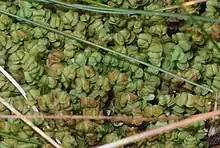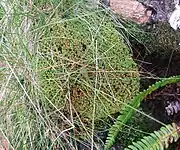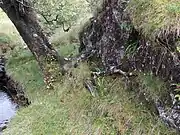Mylia taylorii
Mylia taylorii, or Taylor's flapwort,[1] is a species of leafy liverwort.
| Mylia taylorii | |
|---|---|
 | |
| Scientific classification | |
| Kingdom: | Plantae |
| Division: | Marchantiophyta |
| Class: | Jungermanniopsida |
| Order: | Jungermanniales |
| Family: | Myliaceae |
| Genus: | Mylia |
| Species: | M. taylorii |
| Binomial name | |
| Mylia taylorii (Hook.) Gray | |
Description
Mylia taylorii forms dense mats or hemispherical colonial growths of vertical shoots which have a swollen, slimy appearance when damp. The shoots are yellow-green tinged with brown or red, 3 – 8 cm tall. The leaves are up to 2.4 mm long and become close and overlapping towards the shoot tips. The rounded leaves have an entire margin, are attached to the stems obliquely and are succubous. Small narrow underleaves are present.
Asexual reproduction occurs by gemmae can be found on the margins of the upper leaves.
Mylia taylorii is dioecious but fertile plants are uncommon in Britain. The dark brown capsule is ovoid - globose.
Distribution
Mylia taylorii is found in mountainous districts of northern Europe, the mountains of Continental Europe, Greenland and eastern North America from Newfoundland to Tennessee. There are scattered records for western North America and eastern Asia. Mylia taylorii is probably most common in Great Britain and Scandinavia.
Ecology and conservation
Typically grows on peaty banks, bases of trees, rock faces, screes and open woodland in high rainfall climates.
According to Ratcliffe's account of oceanic bryophytes bordering the Atlantic, M. taylorii is classified as a Western British species.[2]
The distribution of M. taylorii is limited by a requirement for at least 120-140 wet days per year.[2] In Britain it is often found in the widespread derelict forests of sessile oak (Quercus petraea) and downy birch (Betula pubescens), managed as poor sheep pasture with scattered trees, in the uplands of Western Britain.
Mylia taylorii is consistently calcifugous in its choice of substrate.
Gallery
 Mylia taylori colony.
Mylia taylori colony. Habitat of Mylia taylori. Near Kendal, Cumbria, England.
Habitat of Mylia taylori. Near Kendal, Cumbria, England.
References
- Edwards, Sean R. (2012). English Names for British Bryophytes. British Bryological Society Special Volume. Vol. 5 (4 ed.). Wootton, Northampton: British Bryological Society. ISBN 978-0-9561310-2-7. ISSN 0268-8034.
- Ratcliffe, D.A. (1968). An Ecological Account Of Atlantic Bryophytes in the British Isles. New Phytol 67: 365
Further reading
Macvicar, S.M. (1926). The Student’s Handbook of British Hepatics. Wheldon & Wesley Ltd. London.
Smith, A.J.E. (1991). The Liverworts of Britain and Ireland. Cambridge University Press.
Watson, E.V. (1981) British Mosses and Liverworts: An Introductory Work. Cambridge University Press
External links
![]() Media related to Mylia taylorii at Wikimedia Commons
Media related to Mylia taylorii at Wikimedia Commons